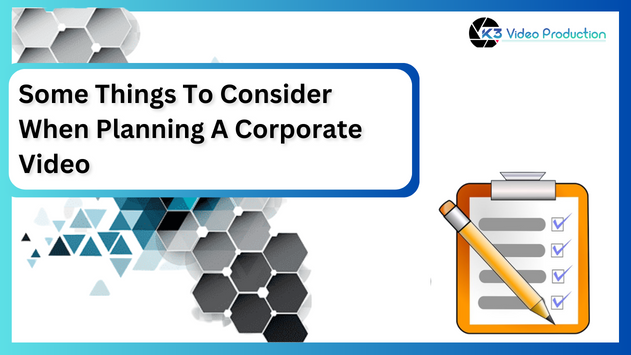Are you interested in leaving a memorable impact to your corporate video? It’s clear that without proper planning, the outcome will not be favorable. Every aspect must be properly planned; from your goals to the style and copy. Who is your market? In what format would you like to share it?
Table of Contents
ToggleTherefore, the most important aspect of developing a good story is ensuring that its essence will find a sympathetic ear. There are many ways to create a video, and with the right style, script, and storyboarding, your vision will come to life.
Costs and funding are also involved. Your post-production and distribution plan will help enhance the reach of the overall message communicated in your video.
Now it’s time to entice your viewership and reach your business goals. Its time to produce a corporate video production that will leave a lasting impression on the audience. It’s time to plan!
What Is A Corporate Video?
A corporate video is a marketing technique a business organization uses to market its brands, products, services, or internal endeavors. It is a style of communication that uses moving visuals, sound, and narration to impart a particular message. Some of the most common types of corporate videos are promotional videos, brand stories, product explainers, training videos, and event recaps.
The overall goal of any corporate video is to capture the attention of the target audience, spread awareness about the corporate brand and its values, share important messages, and attain business goals. Professionally produced videos may include recorded videos, animations, graphics, voiceovers, and interviews with different experts.
Corporate videos are most commonly implemented in a number of settings, including the Video Production Company website, Facebook, Twitter, LinkedIn, during a presentation, at tradeshows, and internally. This is a strong method of presenting a business’s ethos, climate, and services while building confidence and reliability with the Target market.
How To Plan A Corporate Video?
Plan your corporate video by taking these factors into account:
- Define Your Goals
Such goals and objectives need to be worked out before starting the video project. What are the strategies that you wish to adopt to ensure that achieve your set objectives? Do you want your target public to know your brand, get informed about a topic or product, make a new purchase or get acquainted with a new product or service? It is therefore important to determine your goals right from the start which ensures that the content and the message conveyed in your video fits your marketing goals.
- Identify Your Target Audience
For the creation of a video that would be meaningful and tangible to the target audience, it is essential to know the latter. Consider age, hobbies, issues they have, or the way they like to spend their time online. When understanding the tone and style that is right for you, and the message you wish to convey to your intended audiences, they will be interested and compelled.
- Craft a Compelling Story
When it comes to corporate videos, one can learn that they are an effective means of storytelling. Convey an emotional message and forget about anything that would remind of the advertisement. When written properly, you can share the brand story, present the success stories of customers, or even demonstrate the effects of the products.
- Plan Your Key Messages
Ideally your video should communicate the points you feel relevant for the viewers. The messages that you send must be pertinent to your purpose and relevant to your audience. Make your messages short and catchy and ensure they are in line with the brand’s ethos. I have discovered that the audience can grasp and assimilate the message depending with the clarity of the intended message.
- Choose the Right Video Style
The second step focuses on determining the kind of video that will effectively communicate your message as well as capture the attention of your intended target public. The possible formats for videos are, live-action, animated, interview based, product tutorials and many more. Depending on the needs of your brand, the style of the video, and the preferences of your target viewers, the style can be chosen.
- Script and Storyboard
After you define what your goals are, who your audience is, your messages, and the type of video you want, comes the writing of the script and creating a storyboard. Scripting is what provides a script for the dialogue, the narrative or the voice-over while storyboarding provides an illustration of each shot. They help you to predict the flow of the video, and when it is completed, the audience will find the whole picture rather interesting and consistent.
- Budget and Resources
Determine your objectives before planning your corporate video to match your budget and resources. Ask if you can make the video yourself or if you have to pay a professional video production company. Make sure you have planned your equipment, talent, location, as well as the post-production editing to cover the entire cost.
- Location and Set Design
Choose appropriate places and background layouts that are appropriate to the content and tone of your video. The location and set design of a video should complement this aspect and be harmonious with the intended location – be it an office environment, an outdoor shooting, or a specially constructed shooting site.
- Casting and Talent
For videos that require actors, presenters, or spokespersons, it is vital to look for the talents that would best represent your company and appeal to your viewer. It is also recommended to cooperate with a talent agency or casting specialists to introduce the brand values of your choice and ensure that the performers will be able to convey your messages successfully.
- Plan for Post-Production
Post-production involves the final stages of filming that may involve cutting of the video, addition of graphics or animations, choice of music, and the final rendering of the video. Time and resources should be devoted to this phase to avoid any sloppy finish, unprofessional appearance of work or deviation from the initial vision.
- Distribution and Promotion
Consider how and where to release and advertise your business video. You can use it in your website, for your presentation, as well as on your social media pages. Draw up a distribution and promotion plan to ensure the video is as far-reaching and effective as possible.
- Analyze and Measure Success
Once your video is live, you should consider tracking its metrics and effectiveness. This way, you can compare the views, engagement, conversion, or even feedback on the materials being used. Because of this data, your future video strategies will be more data-driven and accurate.
Summing Up
Planning a corporate video is crucial to creating a successful and impactful visual marketing tool. By considering factors such as goals, target audience, storytelling, video style, budget, and post-production, a business can ensure its video effectively communicates its message and achieves desired outcomes.
A well-planned corporate video can engage viewers, enhance brand awareness, and increase brand loyalty. By doing so, businesses can demonstrate their unique identity, products, or services while building credibility and trust with their audiences.
By planning, businesses can optimize resources, create visually appealing videos, and strategically distribute them to increase reach and impact. Businesses can refine their video strategies by analyzing the video’s performance and measuring its success.
Corporate videos that effectively convey the desired message, resonate with the potential audience, and contribute to the overall marketing objectives of an organization must be carefully considered at every stage of the process.
FAQs
1. What is a corporate video?
A corporate video is a visual marketing tool used by businesses to promote their brands, products, services, or internal initiatives. It employs moving visuals, sound, and narration to deliver a specific message. Common types include promotional videos, brand stories, product explainers, training videos, and event recaps.
2. Why is planning important for a corporate video?
Proper planning ensures that all aspects of the video—from goals to style and copy—are aligned and well-executed. This enhances the likelihood of producing a high-quality video that effectively communicates the intended message and achieves business goals.
3. How do I define my goals for a corporate video?
Start by identifying what you want to achieve with the video. Do you want to increase brand awareness, inform the audience about a product, encourage purchases, or introduce a new service? Clearly defined goals will guide the content and message of your video.








